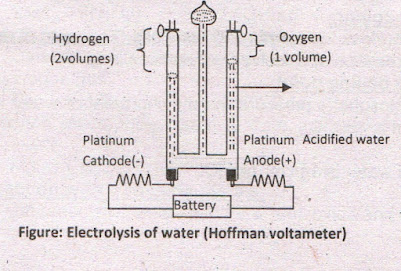SHAMS NOTES ENVIRONMENTAL CHEMISTRY II CHAPTER NO.15
Q.1: Describe
the occurrence/sources of water.
Ans: Occurrence of water:
Water is one of the most abundant natural resources
present on earth. It has been estimated that the total
volume of water present on earth is about 1,33 billion cubic
kilometers. It covers nearly 70 percent of the earth's surface.
The major reservoirs of water on earth surface are oceans,
ice caps, glaciers, underground water, inland
water and atmospheric water.
The oceans contain more than 97percent of the total water.
The rest of the water is in the form of glaciers, ice caps, underground
water, inland water, and atmospheric water.
The inland water includes rivers, lakes, streams, canals, and soil moisture.
|
S.No |
Water reservoirs |
Amount of water |
|
1 |
Oceans |
97.5% |
|
2 |
Glaciers and ice caps |
2.14% |
|
3 |
Underground
water |
0.6% |
|
4 |
Inland water |
0.2% |
|
5 |
Atmospheric water |
0.001% |
Although an enormous amount of water is present on earth but
the freshwater needed for humans is only 0.2% of
the total.
Q.2. Describe the importance of water?
Importance
of water:
Water is very important for us and for the
whole world. After air, water is the second important agent for the survival of
life. Without water, life is impossible. In the holy
Quran the importance of water has been revealed
as mentioned in the following verse:
Translation: And we made every living thing from water.
Some importance of water is given
below:
i.
Importance for life survival:
Humans can live without food for more than two months but without water, they cannot live for more than a week.
ii.
Importance for the body of humans and plants:
Human the body contains about 65-70 percent of water while plants contain 50 to 80 percent water.
iii.Importance for biological processes:
Water maintains various biological processes. The main function of protoplasm
is due to the presence of a constant amount of water in it. The various reactions which occur in
out body, for our existence, are due to water.
iv.
Medicinal Importance:
A large number of medicines are prepared in
water.
v.
Importance of transport:
Water
is a good medium of transportation as ships and boats move on water.
vi.
Importance as a universal solvent:
Water is a universal solvent as it can
dissolve many substances in it. Due to this property water is
used for various purposes like cleaning, making
medicines etc.
vi.
Cooking and washing:
Cooking and washing are done in water.
vii. As coolant:
It is used as a coolant in radiators of automobiles engines. It is also used
as a coolant in nuclear power plants, iron and steel industries, and other
heavy industries.
viii.
Agricultural importance:
Large
amount of water is needed to cultivate fruits, vegetables, and other
crops.
ix.
Industrial importance:
Various
industries require water for various purposes like textile industries,
paint industries, fertilizer industries
Thus
in short, it can rightly be said that without water life is impossible.
Q.3: Write a note on maintaining
water quality.
Ans:Maintaining
water quality:
It is explained under the following
headings:
Good quality water:
Water
which supports living organisms and protects their health is good
quality water.
Basis of
water quality:
The
quality of water is determined on the basis of its physical. chemical,
biological and radiological characteristics.
Ways to maintain good quality water:
A wide range of human activities is affecting the quality of water. If this
is not controlled, not only the environment will suffer but we will face numerous
problems like shortage of drinking water, irrigation problems, etc.
The following are some ways to maintain good
quality water.
i.
Awareness campaign:
As humans are responsible for affecting the good quality of water. Therefore,
its quality can be maintained by promoting awareness among the
people about water quality.
ii.Process waste materials:
Waste material must be properly processed and must not
be added to water reservoirs,
III. Process sewage water:
Sewage water must not be added to water reservoirs
and must be processed
properly.
iv. Avoid wasting water:
As
only 0.2 percent of water is available of human use. Therefore, wastage
of water must avoided. We must use the water whenever needed.
Q.4: Describe the composition of water.
Ans: Composition of water:
Water is a compound of hydrogen and oxygen. However, it was considered
as an element before 1776 AD. In 1776 AD, Henry Cavendish, experimentally
proved that water is not an element but a compound of hydrogen and oxygen. The composition of water is given
below:
Composition by volume:
Water contains two parts of hydrogen and one part of oxygen by volume.
This ratio can be determined experimentally by the electrolysis of water
in Hoffman's voltmeter in the presence of an electrolyte. When an electric current
is passed through acidified water it gives two parts of hydrogen
and one part of oxygen.

